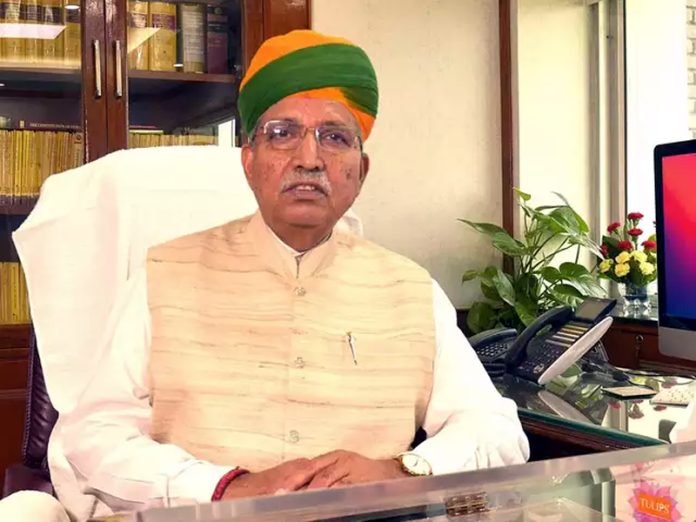Excelsior Correspondent
JAMMU, Dec 2: Law Minister Arjun Ram Meghwal today confirmed that Women’s Reservation Bill for Jammu and Kashmir and Puducherry Legislative Assemblies will be introduced in upcoming session of the Parliament, beginning December 4.
Besides this, four other bills pertaining to Jammu and Kashmir including grant of Scheduled Tribe (ST) status to Paharis and reservation to Other Backward Classes (OBCs), are also being listed in the Parliament session.
Addressing a press conference in New Delhi ahead of the winter session of Parliament, Meghwal said the Government has listed two bills for introduction in the Winter session of Parliament to extend the provisions of the Women’s Reservation Law in the Union Territories of Jammu and Kashmir and Puducherry.
Excelsior had exclusively reported a day before that a bill granting 33 percent reservation to women in Jammu and Kashmir Assembly will be tabled in the Parliament in its winter session. This will reserve 29 or 30 seats for women in 90-member UT Assembly. Already there is eight and 10 percent reservation for SCs and STs respectively in the House by virtue of which seven seats are reserved for SCs and nine for STs.
However, provisions of Women Reservation are expected to come into force after 2029.
Meghwal said that since there is a provision in the Constitution, Delhi — also a Union Territory — was included in the Women’s Reservation Bill passed by Parliament in September.
Responding to a question after an All-Party Meet convened by the Government ahead of the session, Meghwal explained that there is no provision as yet to extend the provisions of the Law in the Union Territories of Jammu and Kashmir and Puducherry.
“That is why separate bills are being brought after discussion,” he said.
The Government has listed The Government of Union Territories (Amendment) Bill, 2023, for introduction, consideration and passage in the session beginning Monday.
It seeks to insert provisions for providing reservation to women in the Puducherry Legislative Assembly.
Similarly, The Jammu and Kashmir Reorganisation (Amendment) Bill, 2023, seeks to reserve for women a third of the total number of seats in the Legislative Assembly of Jammu and Kashmir.
While there is a provision for a legislative assembly in Jammu and Kashmir, the Union Territory is under President’s Rule at present.
Officially known as the Constitution (106th Amendment) Act, the Women’s Reservation Law seeks to provide 33 per cent reservation to women in the Lok Sabha and state Assemblies.
According to its provision, “It shall come into force on such date as the Central Government may, by notification in the Official Gazette, appoint.”
During a special session of Parliament in September, Prime Minister Narendra Modi had described the law as “Nari Shakti Vandan Adhiniyam”.
The Constitution amendment bill was passed by the Lok Sabha with near unanimity and the Rajya Sabha with unanimity.
The law will take some time before being implemented as the next census and the subsequent delimitation exercise — redrawing of Lok Sabha and Assembly constituencies — will ascertain the particular seats being earmarked for women.
The quota for women in the Lok Sabha and assemblies will continue for 15 years and Parliament can later extend the benefit period.
Besides, as per the sources, four bills pertaining to Jammu and Kashmir which were introduced in Lok Sabha during Monsoon session of the Parliament in July but were not taken up for pass motions, are likely to be taken up for the Parliament nod in the winter session.
One of the bills pertained to nomination of two Kashmiri migrants including one woman and a Pakistan occupied Jammu Kashmir (PoJK) refugee in Legislative Assembly of Jammu and Kashmir by the Lieutenant Governor while the other is about grant of Scheduled Tribe (ST) status to Pahari Ethnic Tribe, Paddari Tribe, Gadda Brahmans and Kolis.
Third bill proposed to change nomenclature of Other Social Castes (OSCs) to Other Backward Classes (OBCs) for grant of reservation while fourth bill will include Valmikis in the list of Scheduled Castes.
The Jammu and Kashmir Reorganisation (Amendment) Bill, 2023 provides for nomination of not more than two members, one of whom shall be a woman, from the community of Kashmiri migrants, and one member from displaced persons from Pakistan occupied Jammu and Kashmir, to the Legislative Assembly of the Union Territory of Jammu and Kashmir.
The Constitution (Jammu and Kashmir) Scheduled Castes Order Bill 2023 seeks to include the Valmiki community as a synonym of Chura, Bhangi, Valmiki and Mehtar in the list of Scheduled Castes of Jammu and Kashmir.
Ahead of the Winter session of Parliament, the government on Saturday asserted that it was ready for a discussion on all issues provided the opposition ensures an enabling environment in the House.
Meanwhile, as leaders of political parties in Parliament met in New Delhi today to discuss the agenda for the Winter session beginning Monday, Opposition leaders demanded English nomenclature for the three bills seeking to replace criminal laws while also flagging issues of price rise, “misuse” of probe agencies, and Manipur.
Briefing reporters, Parliamentary Affairs Minister Pralhad Joshi said the Government assured during the meeting that it is ready for discussion on all issues.
He, however, said the Opposition must ensure an enabling environment for discussion to take place.
Joshi said the Government is fully ready for a structured debate and has requested the Opposition to let the House function smoothly.
He added that the Government has taken the Opposition’s suggestions positively.
Joshi said 19 bills and two financial items were under consideration.


